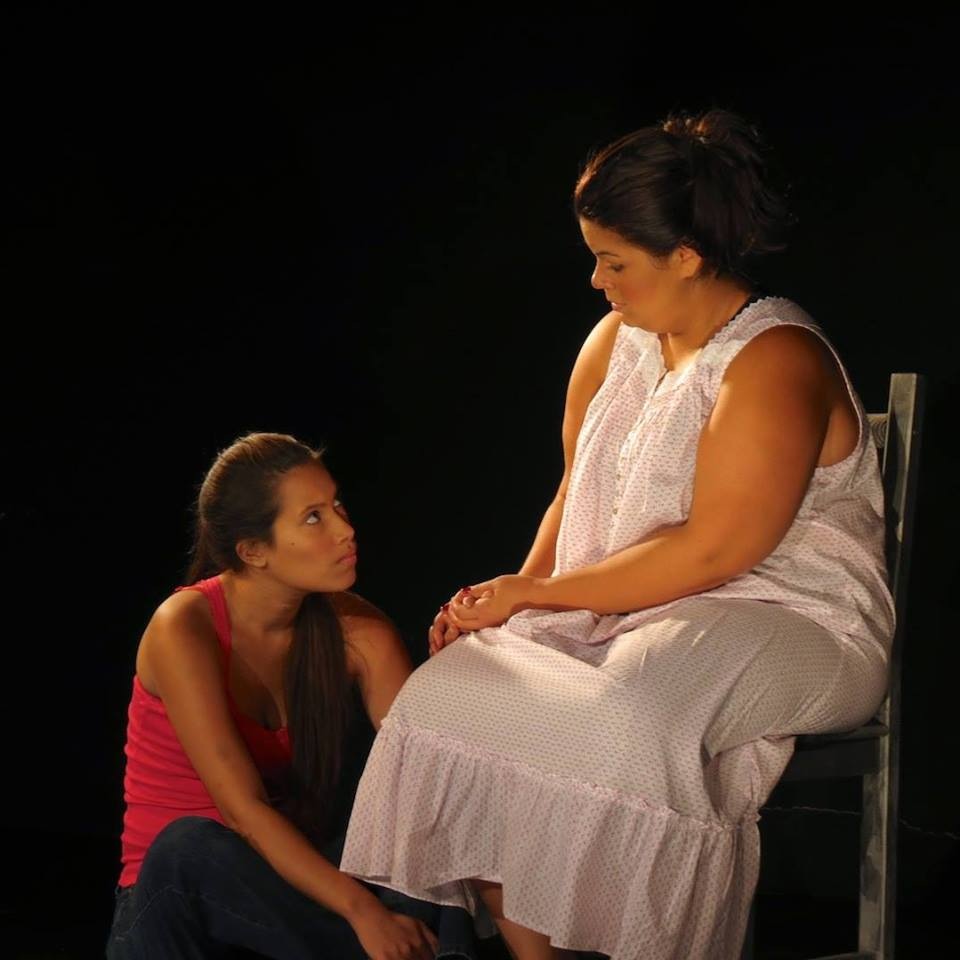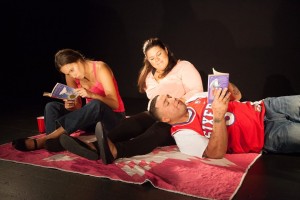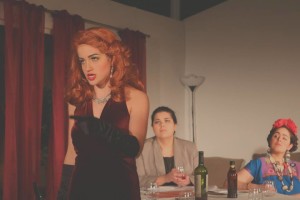Playwright-director John Rosenberg continues his series of long-form interviews of varied creators and theater peeps with Erlina Ortiz, cofounder and resident playwright of Power Street Theatre Company. (Read other interviews in this series.)

John Rosenberg: Who are you?
Erlina Ortiz: Hmmm. Okay. I am Erlina Dahiana Ortiz Arias. That’s my full Dominican name but you can just call me Erlina since that’s usually complicated enough. I am a Dominican-American writer, performer, and theatermaker. I am resident playwright with Power Street Theatre Company. I am a lifelong babysitter. Besides theater, being a part of children’s lives and helping them learn and grow is my favorite thing. I also watch a lot of science documentaries. Things like black holes, string theory, early earth, evolution etc… I just love learning and trying to understand it all. Doesn’t it just blow your mind that we actually don’t have any idea what all THIS is? I am a survivor of Crohn’s Disease oh and a co-parent to my three cats with my partner.
John Rosenberg: Why did you say it like that?
Erlina Ortiz: Well those are the main things that define my existence at this point in my life. Theater, Kids, Crohn’s.
John Rosenberg: How long have you been a playwright?
Erlina Ortiz: I started calling myself a playwright about 3 years ago when I got accepted into The Foundry @ PlayPenn though I had been writing plays and writing in general long before that. My way into theater has been through performing, and the reason I started writing was because I was underwhelmed with the options I had as Latina actress in this business. I think I was afraid to accept the Playwright title though, because I thought that meant I had to let go of the Actor title. I learned though that this city, and the business in general is much more open to people working in all different mediums. Still, playwriting is usually my main focus because it is the one thing I don’t have to wait for someone else to give me permission to do.
John Rosenberg: What did you call yourself before you were accepted by The Foundry?
Erlina Ortiz: I called myself an actor who also writes and directs. Or I’d call myself a “theater person.”
John Rosenberg: How long have you been a performer?
Erlina Ortiz: Since my earliest memories. When my brother was little I would play ‘remote’ with him for hours. He would switch a fake remote to different channels, and I would act like whatever would be happening on that channel. Soaps, talks shows, action movies, comedy, whatever, we were both entertained. Sometimes, I would pretend like the wires got crossed and I would get possessed by some spirit from another time or dimension, or by a wild animal. I remember getting lost in these roles for hours with my brother CONVINCED his sister was never coming back. Then, when I discovered Mexican-American singer Selena (RIP), that was it, I was done. I wanted to be on stage and I wanted people listening to me sing. Sadly, I was not a very good singer… or dancer, so becoming an actor was the goal.
John Rosenberg: Hahahahaha, you must have freaked your brother out. Is he your little brother?
Erlina Ortiz: Yes, he’s four years younger than me. Add Media

John Rosenberg: How long have you been a theatermaker?
Erlina Ortiz: I started realizing my passion for theater beyond my own desire to be performing when I started working with Power Street. My desire to be successful had been primarily selfish up to that point. However, after we did our first show (which I also directed) and I realized how much it meant to the actors to have these roles that resonated with their life experiences, and how many people from the neighborhood came out to pack the house. How they expressed how much it meant to them to see their stories represented, to see their abuela or primo on stage… it just changed everything for me. I had a mission as an artist. I knew how much theater had meant to me in my life and I want to bring that to as many people as possible.
John Rosenberg: How did Power Street Theatre come into being?
Erlina Ortiz: Power Street came into being when founder Gabriela Sanchez had had enough of white supremacy at Temple University. I’ll go ahead and say, I love my alma mater, but like most institutions it was not naturally created for a person of color to thrive. I was almost graduating and feeling very discouraged about what the future was going to hold when Gabi approached me in class and asked me to join her newly formed theater company. I was working as an intern at a company in the city by then, so I knew this was no simple feat, but Gabi always had an energy about her like there was no way anyone was going to stop her from achieving her dream, so I jumped on board and never looked back.
John Rosenberg: How did you experience white supremacy at Temple in the theater department?
Erlina Ortiz: Well, 90% of the playwrights, directors, performers that we learned about were white, usually white men. I had two non-white teachers the entire time I was at Temple. When you are an undergrad in an acting program the most important thing in the world is getting cast. By my junior year I wasn’t even auditioning anymore for main stage shows. I started seeing a pattern on who would get cast and didn’t see myself as part of that pattern in any way. I didn’t know there were successful Latinx playwrights out there. I learned about the grand Maria Irene Fornes just about two years ago and I wanted to SCREAM. I remember thinking, knowing about this woman would have meant so much to me as an undergrad, why wasn’t this a part of my curriculum? White Supremacy. The Patriarchy. All that bullshit.
John Rosenberg: What kind of roles were you offered as a Latina performer?
Erlina Ortiz: …none.
John Rosenberg: Who is the grand Maria Irene Fornes?
Erlina Ortiz: She’s an amazing poetic playwright, director, and teacher. The New York Times just did a beautiful obit on her in October when she passed away. I went to a symposium about her and her work last year with Gabi Sanchez for a Latinx Theatre Commons event. The activities we did during the workshops so often involved some sort of daydreaming which is how I write. If that doesn’t make any sense I recommend Conducting a Life, Reflections On the Theatre of Maria Irene Fornes by Caridad Svich and Maria M. Delgado which I am currently reading in preparation for the class I’ll be teaching next week.
John Rosenberg: Where do you think white supremacy stems from?
Erlina Ortiz: Wow. Well. Let’s see. This is in no way researched just my interpretation of things. Western Civilization which was mostly caucasian developed more advanced weaponry and became obsessed with capital. They discovered other nations that were living more in tune with the Earth and themed them inferior. They were also mostly Christian and they used their religion to justify their racist and hateful behavior. Oppressed peoples internalized that hate and perpetuated it.
John Rosenberg: I more meant where do you think white supremacy comes from as a sickness? As in, do you think white supremacy came from white people being really insecure or having really low self-esteem?
Erlina Ortiz: No, I guess I never really thought of it like that. I think we humans are naturally inclined towards tribalism because that’s the way we’ve survived for millions of years, and there are people who know how to take advantage of that mentality and stoke fear and hatred towards the other ‘tribe.’ But we have to evolve beyond that if we are going to survive on this planet for much longer. I don’t think there is anything wrong with having your tribe, but when you start thinking that your tribe is better and deserves more than the other tribes then that’s the problem. I can understand why it would be difficult to let go of power when you have it, especially if that’s the only way you feel relevant or important. I just think we need to work really hard at helping people connect with each other so we can build the empathy and communion that is sorely lacking. I truly believe theater will save us. Well art in general but especially theater.

John Rosenberg: Why is the company called Power Street?
Erlina Ortiz: I think it means something different to everyone. For me it means: reclaiming our power by telling our stories. It means theater is not just for the elite, it is for all of us.
John Rosenberg: Were there any other names in consideration?
Erlina Ortiz: There may have been but if so, that discussion was before I joined up.
John Rosenberg: Who are the principals involved in Power Street?
Erlina Ortiz: Gabriela Sanchez, Asaki Kuruma, Diana Rodriguez, Rachel O’Hanlon Rodriguez, Anjoli Santiago, and me.
John Rosenberg: What kind of shows does Power Street produce?
Erlina Ortiz: Up to now any productions involving a script first have been written by myself. These plays usually deal with universal socio-political themes with an emphasis on Latinx characters. My plays have been about gentrification, domestic violence, rape culture, climate change… These are tough topics but I think the great thing about my plays is they are often lighthearted and comedic which makes sense if you know me. Besides my plays though, we have created devised projects amongst ourselves and with performers from the community on themes such as class, addiction, invisible illnesses, and cultural heritage. We are always looking for ways to learn and grow as individual artists and together as a company.
John Rosenberg: What do you think all of this is?
Erlina Ortiz: I think that we as individual humans are like a radio. The universe is the radio signal and our brains are the antenna picking up that signal. I think the energy of the universe became too grand and complicated and it wanted to experience what it had created from the inside. Or something like that. I don’t mind believing in things I can’t prove.
John Rosenberg: How many plays have you written?
Erlina Ortiz: I’ve written 5.5 plays and the book for a musical.
John Rosenberg: Does 5.5 plays mean you co-wrote the play or it is still half-written?
Erlina Ortiz: Yes, I’m in the middle of writing a new play.
John Rosenberg: Can you walk me through your writing process?
Erlina Ortiz: I firmly believe in keeping my channels open to receiving signals from the universe. If an image or an idea enters my consciousness and makes my heart skip a beat, I immediately stop and write it down wherever I can. From there a central character (or two) will usually emerge and I start to understand this characters dreams and pain. I might start writing down ‘moments’ or images in a file in no particular order, but if I feel like one moment comes after the other I’ll start to move them around on the sheet, usually in a very sterile looking bulletpointed outline. If a scene starts to come out of me while I’m working on the outline, or I hear the characters talking to one another I go with it. Depending on what the issue is being addressed in the play I’ll start reading articles on the topic, listening to podcasts, and in general just immersing myself into this new world. Like marinating. Eventually I’ll have a plethora of moments and short scenes on a file and from there I’ll start from the beginning and usually I’ll write through to the end. By the time I start writing through I’ll usually finish a first draft within 3-6 months. But the marinating time could be years.
John Rosenberg: What playwrights have had a huge impact on your writing?
Erlina Ortiz: I saw In the Heights at the Walnut Street Theatre during a Latinx Community night many years ago and I was crying from beginning to end of that show. I had never heard Spanish on stage, the main character was talking about the Dominican Republic, my island! It was a transformative experience for me. A little bit after that Quiara Algeria Hudes who was a co-creator on that show won the Pulitzer prize for her beautiful play Water by the Spoonful and I was like OKAY. This is a Latina playwright from Philly and she’s winning Tony’s and Pulitzers? Let’s werk. I would also say that Jose Rivera had a huge impact since he was basically the only Latinx playwright I knew from undergrad. My plays all tend to have a little bit of magic in them and I used to feel insecure/unsure about that until I realized that magical realism was part of the canon of Latinx writers.

John Rosenberg: Why do you think magical realism is a part of the canon of Latinx writers?
Erlina Ortiz: In a scholarly sense I have no idea. But I imagine it probably comes from the tradition of storytelling, and perhaps a mix of styles from Spanish, indigenous, and African cultures. That’s the type of stuff I wish I would have learned in school but will have to add to my adult reading list. It is so very long.
John Rosenberg: When you write shows that have magical realism in them, are you trying to make something as spectacular as possible or do you try to create things that are producible? I am wondering how you see your role as the writer in bringing things to life, mostly if you are working with small budgets.
Erlina Ortiz: Great question. The thing is, I never really thought about okay now I’m going to make this magical. It just happened, there are certain moments that just need magic, or a ghost, or something unexplained that just IS. I have tempered some of those moments knowing Power Street’s budget in the past, but recently I gave myself permission to write a play without a budget in mind and it is absolutely insane and totally different from anything I’ve written before but I LOVE it. It needs development yet, and some rewrites but it’s such a weirdly cool play. A house fills up with water, a swarm of magical honeybees, a robot baby comfort toy, it’s just nuts.
John Rosenberg: Do you act in your plays?
Erlina Ortiz: I acted in my play Morir Sonyando in 2014. I only got to perform one weekend though because that was when my intestine burst open and I got diagnosed with Crohn’s disease. The whole thing was hard but the hardest was canceling the show. All my family and friends were coming for the final weekend so I was pretty devastated. I’m gonna go ahead and say that was probably the lowest point of my life. The good part was since they were all already planning on coming down the were able to visit me in the hospital. I hope I get a chance to act in my plays in the future. I have written a lot of middle aged Latina roles so it would be cool to be like 50 and performing in one of my plays.
John Rosenberg: Where were you when your intestines burst? What happened? Jesus Christ. I am glad you aren’t dead. It was probably the right move cancelling the show.
Erlina Ortiz: haha. Yea… well. I don’t know. I feel like it happened the moment I jumped off the stage to give my dad and my uncle a hug. I just remember this sudden sharp pain that was different, more intense, than the pain I had been feeling the weeks… months… prior (don’t neglect your health to put up a show kids!) It was DEFINITELY the right move canceling the show, but it was still the most heartbreaking thing I’ve ever experienced in my life. I’m telling you I have never cried as hard as I did that day it was like a baptism of tears. But we got through it and that’s why Power Street is my family.
John Rosenberg: What happens in the play Morir Sonyando? Doesn’t morir mean to die?
Erlina Ortiz: Morir does mean to die. Morir Soñando is a popular Dominican drink that is so good is makes you die dreaming when you drink it haha. Soñando is dreaming and I said what’s it’s about!
John Rosenberg: How many plays has Power Street produced?
Erlina Ortiz: Up to now we have produced 4 plays and 4 or 5 devised pieces.
John Rosenberg: What are the 4 plays and 4 or 5 devised pieces Power Street has produced?
Erlina Ortiz: MinorityLand about gentrification in North Philadelphia was our first show which I wrote and directed, but also it was devised with the original cast. We are remounting MinorityLand this year in the fall which I’m really excited about. Morir Sonyando was my second play and Power Street’s second show. It means Die Dreaming, and it is about a family in the aftermath of domestic violence and incarceration… but it’s kind of funny too. All my plays are weirdly funny. She Wore Those Shoes was our third official play, this one was about addressing rape culture with a lens on the military where it is prevalent. Our last scripted show was Las Mujeres which is about a workaholic engineer who gets visited by the ghosts of influential Latinas from the past.
Besides that we’ve done Out of Orbit which was storytelling and movement with the theme of privilege. Hidden disAbilities which is about exactly what the title says. I have Crohn’s disease and other Power Street members also have hidden illnesses and disabilities so we realized this was an important topic we wanted to touch upon. Kiss of Adixion about the opioid crisis and Pa’lante which was a Latinx storytelling event with percussion and movement were our last two creations. Those last two were also directed by Gabi. We’ve also hosted various open mics and garden parties throughout the years, and next week we embark on our next journey: educational courses.
John Rosenberg: What are the budgets for the productions?
Erlina Ortiz: Well that changes every year depending on what funding we can get. Founder and managing director Gabriela Sanchez quit her day job in 2017 to do Power Street full time (though she’s still working like 6 other jobs) and that has raised our funds a little bit, but no one at Power Street has a salary, yet. We’ve done shows for as little as 3,000 dollars though that is not something we ever want to do again.
John Rosenberg: Why do you never want to do a show for as little as $3,000 ever again?
Erlina Ortiz: Because it’s not fair. It’s not fair to the actors, it’s not fair to us as a creative team. If everyone had a monthly living stipend or something like they do in the Netherlands it would be a different story, but I can’t stand to pay someone 200 dollars or something for a month of work you know? It’s physically painful. Knowing they need to eat and pay rent. I appreciate people so much you have no idea. But I’m almost 30 years old and I don’t plan on being poor for the rest of my life I really don’t. We’re either going to figure out a way to thrive within this terribly broken system like Cardi B does or we are going to break it.
John Rosenberg: How many different versions of you are there?
Erlina Ortiz: That’s a good question. I’d say there are probably about 3 or 4, but they are all an authentic version of me. I’m a mutable person, in a good way. If you need me to be the leader, then leader Erlina will come out. If you need me to be a follower, then follower Erlina will come out. It’s more like turning up different traits and turning down other ones. If I’m meeting a group for the first time I might not start with vagina jokes. Though I will say as I’ve gotten older the versions of myself have all become a little bit more aligned. It makes all the difference surrounding myself with people who are their unapologetic selves.
John Rosenberg: What are some anecdotes about yourself you like to share with people that put yourself in a good light?
Erlina Ortiz: That’s a fun question. Well kids and animals like me so isn’t that supposed to be a good sign of character? I don’t hate anyone in my heart so that’s probably a good thing too.
John Rosenberg: What do you enjoy about babysitting?
Erlina Ortiz: I’ve always been drawn to kids and had a way with kids. Since I was a little kid myself, whatever event or party we’d go to by the end of the night I’d have a baby on my hip and hoard of little kids around me listening to my every word. They were my original audience. By the time I was 13 I started babysitting and then in college it really became my go-to day job. I just love that kids are these fresh slates soaking up the world. I love to learn, and to facilitate learning. I love that I can be silly and feel close to my inner child when I’m with kids. They just make me happy.
John Rosenberg: What advice would you give yourself in the future?
Erlina Ortiz: Don’t stop journaling. It’s the main thing that will keep you sane.

John Rosenberg: What techniques do you rely on as an actor?
Erlina Ortiz: I love Michael Chekhov. Like Fornes there is an emphasis on imagination. It was my favorite class at Temple and I swear I was possessed once in that class. That’s my goal always as an actor, ‘how can I make this character possess me.’ So I memorize, I daydream, when I’m by myself I practice eating like my character would eat, if I see something funny on the street I imagine what my character would think. It’s all the same tool as playwriting in a way, when it comes to feeling like you really know someone inside and out. The fun about acting is then you get to physicalize it. I like doing very physical over the top type of characters, but I don’t often get that opportunity. I’m gonna have to write that part for myself at some point.
John Rosenberg: What do you experience in your head when you feel positive?
Erlina Ortiz: Thankfulness. An excitement to be alive. Hopeful.
John Rosenberg: What do you experience in your head when you feel negative?
Erlina Ortiz: Overwhelmed. Incapable. Fatigued.
John Rosenberg: Is there anyone you put in a position where they will disappoint you?
Erlina Ortiz: I wanna say all the time because I work in such a collaborative environment. You have to take chances on people left and right, and sometimes you believe in people more than they believe in themselves. I hate ghosting and bad communication. If you can’t make the meeting just tell me, don’t wait until I’m already on my way. The biggest disappointment for me is when my time is disrespected. I have a history of 5-10 minutes of tardiness that I am actively working on improving always (sighs). But if I’m running late I let people know right away. I will never understand how someone can be a hour late to something or never show up without sending a message like for real? I would DIIIIEEE if I did that to someone. Anyway that’s clearly my pet peeve… What was the question?
John Rosenberg: What is the closest you have come to imagining something and then realizing it in the world?
Erlina Ortiz: Literally every time we put up a show. Every time I make a goal and meet it. Also, I’m sure I have nothing to do with this, but I was recently on a soapbox about how we need trains across America and Congresswoman Alexandria Ocasio-Cortez had that in the Green New Deal and I just felt like I had helped manifest that in some way.
